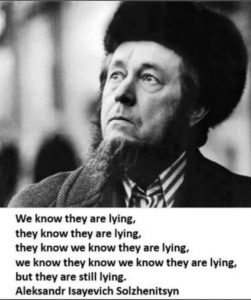
Aleksandr Isayevich Solzhenitsyn was born 11 December 1918 in Kislovodsk, Russian SFSR and died 3 August 2008 in Moscow, Russia.
Aleksandr was raised by his widowed mother and his aunt. His earliest years coincided with the Russian Civil War. By 1930 the family property had been turned into a collective farm. Later, Solzhenitsyn recalled that his mother had fought for survival and that they had to keep his father’s background in the old Imperial Army a secret. His mother encouraged his literary and scientific interests and raised him in the Russian Orthodox faith.
During the World War II, Solzhenitsyn served as the commander of a sound-ranging battery in the Red Army, was involved in major action at the front, and was twice decorated. He was awarded the Order of the Red Star on 8 July 1944 for sound-ranging two German artillery batteries and adjusting counterbattery fire onto them, resulting in their destruction.
While serving as an artillery officer in East Prussia, Solzhenitsyn witnessed war crimes against local German civilians by Soviet military personnel. The noncombatants and the elderly were robbed of their meager possessions and women and girls were gang-raped to death. In February 1945, while serving in East Prussia, Solzhenitsyn was arrested by SMERSH for writing derogatory comments in private letters to a friend, Nikolai Vitkevich, about the conduct of the war by Joseph Stalin, whom he called “Khozyain” (“the boss”), and “Balabos” (Yiddish rendering of Hebrew baal ha-bayit for “master of the house”). Also he had talks with the same friend about the need of a new organisation against the Soviet regime. He was accused of anti-Soviet propaganda under Article 58 paragraph 10 of the Soviet criminal code, and of “founding a hostile organization” under paragraph 11. Solzhenitsyn was taken to the Lubyanka prison in Moscow, where he was interrogated. On 7 July 1945, he was sentenced in his absence by Special Council of the NKVD to an eight-year term in a labour camp. This was the normal sentence for most crimes under Article 58 at the time.
During his imprisonment at the camp in the town of Ekibastuz in Kazakhstan, he worked as a miner, bricklayer, and foundry foreman. His experiences at Ekibastuz formed the basis for the book One Day in the Life of Ivan Denisovich.
In March 1953, after his sentence ended, Solzhenitsyn was sent to internal exile for life at Birlik, a village in Kazakhstan. It was during this decade of imprisonment and exile that Solzhenitsyn abandoned Marxism.
After Khrushchev’s Secret Speech in 1956, Solzhenitsyn was freed from exile and exonerated. In 1960, aged 42, he approached Aleksandr Tvardovsky, a poet and the chief editor of the Novy Mir magazine, with the manuscript of One Day in the Life of Ivan Denisovich. It was published in edited form in 1962, with the explicit approval of Nikita Khrushchev, who defended it at the presidium of the Politburo hearing on whether to allow its publication, and added: “There’s a Stalinist in each of you; there’s even a Stalinist in me. We must root out this evil.” The book quickly sold out and became an instant hit.
After Krushchev’s removal in 1964, the cultural climate again became more repressive. Publishing of Solzhenitsyn’s work quickly stopped; as a writer, he became a non-person, and, by 1965, the KGB had seized his papers.
Solzhenitsyn wrote The Gulag Archipelago from 1958 to 1967. It was a three-volume, seven part work on the Soviet prison camp system (Solzhenitsyn never had all seven parts of the work in front of him at one time). The book was based upon Solzhenitsyn’s own experience as well as the testimony of 256 former prisoners and Solzhenitsyn’s own research into the history of the Russian penal system. It discussed the system’s origins from the founding of the Communist regime, with Vladimir Lenin having responsibility, detailing interrogation procedures, prisoner transports, prison camp culture, prisoner uprisings and revolts, and the practice of internal exile. The Gulag Archipelago has sold over thirty million copies in thirty-five languages. It’s rich and varied authorial voice, its unique weaving together of personal testimony, philosophical analysis, and historical investigation, and its unrelenting indictment of communist ideology made The Gulag Archipelago one of the most influential books of the 20th century.
In 1969, Solzhenitsyn was expelled from the Union of Writers. In 1970, he was awarded the Nobel Prize in Literature. In August 1971, the KGB attempted to assassinate using a biological agent (most likely ricin). The attempt left him seriously ill but was unsuccessful. KGB chief Yury Andropov deported him to West Germany. He received his 1970 Nobel Prize at the 1974 ceremony.
In 1990, his Soviet citizenship was restored, and, in 1994, he returned to Russia with his wife, Natalia, who had become a United States citizen. He became a supporter of Vladimir Putin who said he shared Solzhenitsyn’s critical view towards the Russian Revolution. All of Solzhenitsyn’s sons became US citizens. One, Ignat, is a pianist and conductor.
